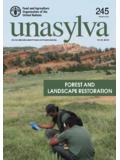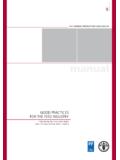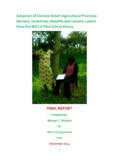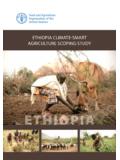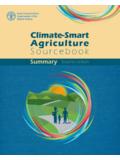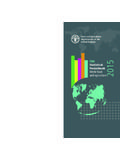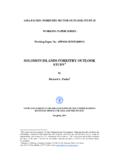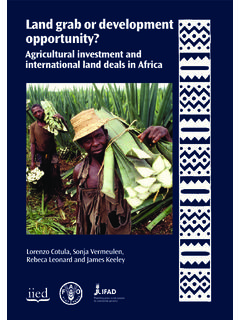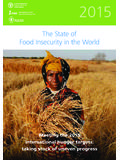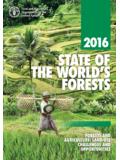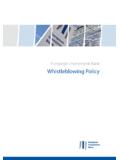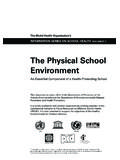Transcription of IMPROVING TENURE SECURITY FOR THE RURAL POOR
1 LEP Working Paper # 5 Workshop for Sub-Saharan Africa FOOD AND AGRICULTURE ORGANIZATION OF THE UNITED NATIONS Support to the Legal Empowerment of the Poor (LEP) IMPROVING TENURE SECURITY for the RURAL poor with the financial assistance of Norway under a Programme Cooperation Agreement IMPROVING TENURE SECURITY FOR THE RURAL POOR MOZAMBIQUE COUNTRY CASE STUDY Simon Norfolk and Christopher Tanner 2007 IMPROVING TENURE SECURITY FOR THE RURAL POOR MOZAMBIQUE COUNTRY CASE STUDY Simon Norfolk and Christopher Tanner 2007 Photograph by Margarida David e Silva (Safari hunting operator handing over the community share of revenues to the community leaders in the Macossa Coutada 9) This paper was prepared under contract with the Food and Agriculture Organization of the United Nations (FAO). The positions and opinions presented are those of the author alone, and are not intended to represent the views of FAO.
2 IMPROVING TENURE SECURITY for the RURAL poor Most of the world s poor work in the informal economy outside of recognized and enforceable rules. Thus, even though most have assets of some kind, they have no way to document their possessions because they lack formal access to legally recognized tools such as deeds, contracts and permits. The Commission on Legal Empowerment of the Poor (CLEP) is the first global anti-poverty initiative focusing on the link between exclusion, poverty and law, looking for practical solutions to the challenges of poverty. CLEP aims to make legal protection and economic opportunity the right of all, not the privilege of the few. (see ) CLEP has identified specific TENURE issues, including i) how to make property rights accessible to all, especially poor and marginalized communities, groups or individuals and ii) how to ensure that property rights of the poor function as means of achieving economic and social empowerment, particularly in the context of gender equity and those affected by HIV/AIDS.
3 There is growing empirical evidence that giving legal recognition to informal property rights in urban areas brings positive results. However, a similar body of evidence does not exist for the empowerment of people in RURAL areas. Instead, the signs are mixed, resulting in a largely sterile and divisive debate on formalization of rights. FAO, with donor funding from Norway, has undertaken a set of activities for IMPROVING TENURE SECURITY of the RURAL poor in order to meet the needs of FAO member countries and, in turn, support the CLEP. This work falls within the FAO corporate strategy on Sustainable RURAL livelihoods and more equitable access to resources . Recognizing that secure access to land and other natural resources (forests, water, fisheries, pastures, etc.) is a crucial factor for eradication of food insecurity and RURAL poverty, FAO s cross-departmental and cross-disciplinary work focused 2005-2006 activities on sub-Saharan Africa which has the world s highest percentage of poor and hungry people.
4 This paper is part of FAO s effort to inform the CLEP through its working group on property rights. It was prepared for the regional technical workshop on IMPROVING TENURE SECURITY of the RURAL poor held in Nakuru, Kenya, October 2006, at which issues relating to property rights were reviewed and actions were initiated to develop common strategies for IMPROVING the protection of rights to land and other natural resources of the RURAL poor. Simon Norfolk Christopher Tanner Independent consultant on land and development issues Terra Firma Lda. FAO Senior Technical Advisor on land and natural resources policy and legislation Centre for Legal and Judicial Training, Ministry of Justice Maputo Maputo March 2007 March 2007 ii Mozambique country case study TABLE OF CONTENTS LIST OF EXECUTIVE 1 1 CURRENT POLICY AND LEGAL FRAMEWORK OF LAND TENURE 2 2 THE NATURE OF LAND 3 THE STATE LAND USE AND BENEFIT 3 ACQUIRING LAND USE 4 3 PUBLIC LAND ADMINISTRATION AND 6 THE REGISTRATION OF REAL PROPERTY 6 IMPLICATIONS FOR RURAL LAND 7 4 FORMALIZING DUATS BY OCCUPATION.
5 PARTICIPATION AND 8 LOCAL-LEVEL CONSULTATIONS AND BARGAINING 8 LOCAL COMMUNITY PARTICIPATION IN LAND AND NATURAL RESOURCE 10 SURVEYING AND 11 OPTING OUT BY LOCAL 15 LAND RIGHTS FOR 15 5 FORMALIZATION IN PRACTICE THREE CASE 16 CANHANE 16 THE CHIPANJE CHETU 18 COUTADA 20 6 IMPLICATIONS FOR FORMALIZING DUATS AND HOW THEY CAN BE 22 SHOULD LOCAL RIGHTS BE FORMALIZED?.. 22 DOES FORMALIZING THE DUAT WORK? .. 22 AWARENESS OF RIGHTS, ATTITUDES AND 24 DECISION-MAKING ON LAND RIGHTS PARTICIPATION, REPRESENTATION AND PRACTICAL 7 NEW CHALLENGES TO 28 LAND ENCLOSURES AND 28 MAKE CONSULTATIONS 29 THE NEED TO 30 CONFLICTS AND ACCESS TO 31 SERIOUS INSTITUTIONAL REFORM AND 32 THE REAL PROPERTY 32 THE LAND 33 8 33 37 iiiImproving TENURE SECURITY for the RURAL poor LIST OF ACRONYMS ASL - African Safari Lodge and RURAL Development Programme AWF - African Wildlife Foundation CBNRM - Community-Based Natural Resources Management Programme CFJJ - Centre for Legal and Judicial Training DINATEF - National Directorate of Land and Forests DUAT - direito de uso e aproveitamento da terra (state-granted land right)
6 FAO - Food and Agriculture Organization of the United Nations MITUR - Ministry of Tourism NGO - non-governmental organization ORAM - RURAL Association for Mutual Support PARPA - Plano para o Alivio da Pobreza Absoluta PROAGRI - National Programme for Agricultural Development SPFFB - Provincial Wildlife Services SPGC - Provincial Service of Geography and Cadastre TPSGC - Technical-Professional School of Geodesy and Cartography GLOSSARY DUAT - The direito de uso e aproveitamento da terra (state-granted land right) is currently Mozambique s single form of land TENURE right.
7 It is exclusive, inheritable and transmittable (subject to state approval). Irrespective of the means through which it is acquired, the resulting DUAT right is exactly the same. DUATs can be acquired by: a) customary (traditional) occupation: the occupation of land by individual persons and by local communities, in accordance with customary norms and practices, so long as these do not contradict the Constitution; 1 recognition of long-standing occupancy b) good faith occupation: the occupation of land by individual national persons who have been using the land in good faith for at least ten years; 2 award on a concessionary basis c) award: new rights to land, awarded with the authorization of an application submitted by an individual or corporate person (renewable 50-year state leasehold). iv Mozambique country case study EXECUTIVE SUMMARY Introduction Ever since Mozambican independence in 1975, property in land has been vested in the state.
8 Despite the political and economic shift to a multiparty system and market economy since the 1990 Constitution, this underlying principle has remained in place, and no land may be sold, mortgaged, or otherwise encumbered or alienated. Local traditional land management systems meanwhile have retained a robust role as the de facto land management system of Mozambique. These systems and the rights they attribute to RURAL people were formally recognized in the 1995 National Land Policy and subsequent 1997 Land Law. The Land Policy includes the following basic principles that were incorporated into the new law and its implementing instruments: land belongs to the state and cannot be sold, alienated or mortgaged; customary land systems and the rights allocated through them are recognized; private investment in land is to be promoted with guaranteed secure rights; women and men have equal rights over land; land access and use must obey principles of sustainable use; land access and use must promote principles of equity.
9 While the new law had to respect basic constitutional principles, the legislators also had to develop a law appropriate for a market economy. The land policy therefore seeks to protect existing rights, while also promoting private investment and, to this end, seeks to provide secure land rights for investors as an essential condition for this. The legal framework established by the Constitution and the 1997 Land Law contains several innovative approaches to achieving these goals. These include: establishment of a single form of land TENURE right, the DUAT, irrespective of the means through which it is acquired; recognition in law of DUATs obtained through customary and good faith land occupation; protection in law of DUATs obtained through customary and good faith occupation of land without the need for their formalization and registration; provision of a flexible approach to proving and spatially defining DUATs acquired through customary and good faith occupation; establishment of the right (and obligation) of local rights holders to participate in land and natural resources management and land rights allocation processes.
10 Land rights can be transferred between third parties, but only when linked to the sale or transfer of standing assets. The Constitution recognizes the right to private property and that any improvements and constructions made on or to land over which a private person or firm has a DUAT are the private assets of that person or firm. These assets can be bought and sold, while the underlying DUAT is administratively transferred to the new asset owner. Customary and good faith occupation continue to be the principal means by which the RURAL poor obtain access to land. While these acquired rights enjoy full legal recognition as equivalent to the state DUAT, they do not have to be registered unless circumstances demand. Thus in spite of de jure formalization through legal recognition, protecting these rights in practice and making them work in favour of an equitable and sustainable model of development remains a challenge and takes on new urgency as demand for land by investors continues to rise.
